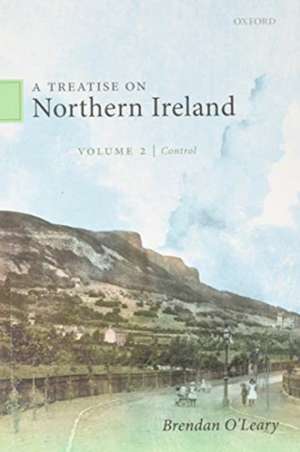A Treatise on Northern Ireland, Volume II: Control
Autor Brendan O'Learyen Limba Engleză Paperback – 20 noi 2020
| Toate formatele și edițiile | Preț | Express |
|---|---|---|
| Paperback (1) | 281.43 lei 10-17 zile | |
| OUP OXFORD – 20 noi 2020 | 281.43 lei 10-17 zile | |
| Hardback (1) | 716.24 lei 10-17 zile | |
| OUP OXFORD – 17 apr 2019 | 716.24 lei 10-17 zile |
Preț: 281.43 lei
Preț vechi: 306.30 lei
-8% Nou
Puncte Express: 422
Preț estimativ în valută:
53.85€ • 56.22$ • 44.57£
53.85€ • 56.22$ • 44.57£
Carte disponibilă
Livrare economică 03-10 martie
Preluare comenzi: 021 569.72.76
Specificații
ISBN-13: 9780198870722
ISBN-10: 0198870728
Pagini: 304
Dimensiuni: 155 x 232 x 16 mm
Greutate: 0.46 kg
Editura: OUP OXFORD
Colecția OUP Oxford
Locul publicării:Oxford, United Kingdom
ISBN-10: 0198870728
Pagini: 304
Dimensiuni: 155 x 232 x 16 mm
Greutate: 0.46 kg
Editura: OUP OXFORD
Colecția OUP Oxford
Locul publicării:Oxford, United Kingdom
Recenzii
This three-volume set is quite the remarkable achievement...I will continue to spend time with these volumes, which will not be surpassed anytime soon. Unlike in so many history books, O'Leary is always trying to explain what happened, or what did not.
He colors his work throughout with lively writing, moving past equivocation and pulling no punches in his assessments of participants or previous scholarship ... the author has thoughtfully structured his books and chapters in a way that is accessible to both non-experts and specialists. Whatever the audience, this is a work of canonical importance for understanding Northern Ireland ... Highly recommended.
The detailed coverage is astonishing, the range immense. The book exemplifies best practice in social science and history, combining both disciplines, asking analytic questions of the historical record and widening the remit of social science - above all by looking carefully both at political calculations and the details of constitutional arrangements. It is important to stress that he offers us an analytic history of Ireland as a whole, paying special attention to developments in the Irish Free State and to the Republic thereafter.
The most prolific, perceptive and powerfully analytical writer on the north in the last 35 years, Brendan O'Leary, has just produced his magnum opus.
He colors his work throughout with lively writing, moving past equivocation and pulling no punches in his assessments of participants or previous scholarship ... the author has thoughtfully structured his books and chapters in a way that is accessible to both non-experts and specialists. Whatever the audience, this is a work of canonical importance for understanding Northern Ireland ... Highly recommended.
The detailed coverage is astonishing, the range immense. The book exemplifies best practice in social science and history, combining both disciplines, asking analytic questions of the historical record and widening the remit of social science - above all by looking carefully both at political calculations and the details of constitutional arrangements. It is important to stress that he offers us an analytic history of Ireland as a whole, paying special attention to developments in the Irish Free State and to the Republic thereafter.
The most prolific, perceptive and powerfully analytical writer on the north in the last 35 years, Brendan O'Leary, has just produced his magnum opus.
Notă biografică
Brendan O'Leary is the Lauder Professor of Political Science at the University of Pennsylvania and World Leading Researcher Visiting Professor of Political Science at Queen's University Belfast. He is the inaugural winner of the Juan Linz Prize of the International Political Science Association for lifetime contributions to the study of federalism, democratization, and multinational states, and was recently elected an Honorary Member of the Royal Irish Academy and to Membership of the US Council on Foreign Relations. Educated in Northern Ireland, Oxford, and the London School of Economics & Political Science he advised parties and governments during and after the making of the Good Friday Agreement. His extensive publications include Power-Sharing in Deeply Divided Places (co-editor, University of Pennsylvania Press, 2013), The Northern Ireland Conflict (OUP, 2004), and Explaining Northern Ireland (co-author, Blackwell, 1995).
